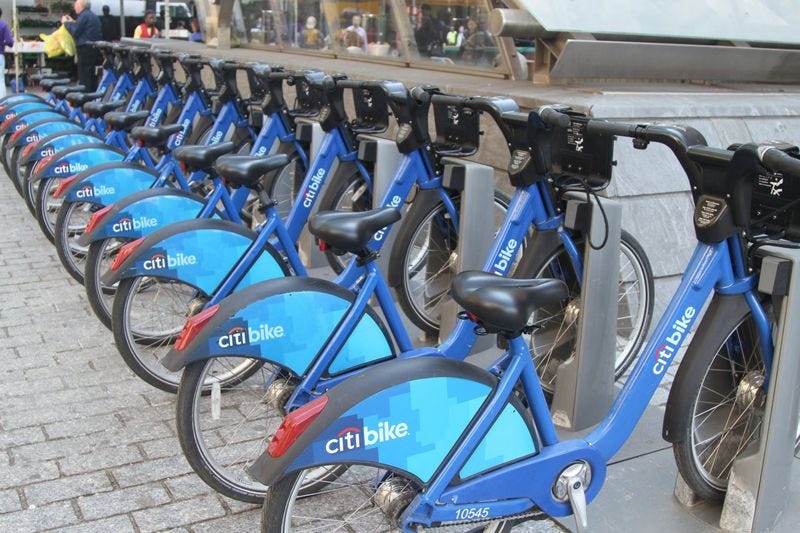Let’s stop pretending cars aren’t rooms on wheels
This week, Uber Eats is getting Japan’s grandmas and grandpas on their feet, Europe’s newest mobility unicorn is born, and Lyft scores a big win in SF, but first…

Here in My Car 🎶
Ask anyone who has ever charged their phone in a center console, eaten takeout over a dashboard, or changed outfits in a backseat: A car is much more than a means of transportation. With four walls and a roof, it is also a private room on wheels.
And just like a car in motion bundles many different kinds of trips, a parked vehicle bundles an almost infinite number of non-driving use-cases. It can be a cubicle, a closet, a phone booth, a dining table, an entertainment center, and more.
When you think of all the things you can do with a car besides drive it, it’s not surprising that people would pay to have access to one even if they didn’t need to go anywhere.
This is what is happening in Japan, where, after reviewing mileage data, several leading car-sharing services discovered that a non-trivial portion of their users were not traveling any distance in their rented vehicles.
Why? According to surveys conducted by the companies, there were many reasons, ranging from wanting somewhere to eat cereal to needing a place to charge a phone after a natural disaster. These users were looking to cars for privacy, shelter, and amenities—not mobility.
You can read more about why people choose to rent cars and not drive them in this article by The Asahi Shimbun. (The tweet below does a good job summing up the various answers they gave.)


More broadly, what these surveys tell us is that, in our harried, hurried, go-go world, there is a need for private spaces that are quiet, comfortable, convenient, and available on-demand 24/7.
Some car-sharing services may embrace this new market of non-drivers. Others will resist because less mileage means less income.
But what if, instead of having to rent vehicles to get the services they wanted, non-drivers could join a network of car-sized pods that they could rent by the minute via an app? These pods could serve different purposes with different amenities, like WiFi, desks, seating, AC outlets, climate control, beds, and more. They could still be stored at street level, in parking spots. To save on fuel, insurance, and other costs, operators could remove their tires and engines and turn them into permanent or semi-permanent structures.

Why do all this? Because if you’re going to unbundle car trips, you also need to unbundle car chores.
Photo by Ben Birchall
You Should Start a Biker Gang
Got friends who are into micromobility? Get a group together and meet us in Berlin on October 1.
From now until the end of July, for every ticket you purchase to Micromobility Europe up to 4, the price per person drops €100.
1 = €525 each
2 = €425 each
3 = €325 each
4+ = €225 each
Get your ticket bundle now and save big.

Is your company interested in sponsoring or exhibiting at Micromobility Europe? Contact us.
Airwaves
In a new episode of the podcast, Oliver Bruce sits down with Tiffany Chu, co-founder and COO at Remix, to discuss the role of software in helping cities plan for better use of their streets and harness the benefits of micromobility.
Listen here.

What You Need to Know This Week
One thing not to forget in the push to reduce parking: Thousands of homeless Americans who live in their cars depend on it to survive. | The Conversation
Gogoro, maker of the best-selling electric mopeds in Taiwan, is piloting a shared service. | TechCrunch
While self-driving cars stall, e-scooters and e-bikes are already transforming cities. | FT
Wind Mobility has raised $50 million in Series A funding. The Berlin- and Barcelona-based startup also unveiled a new scooter with IP67 waterproofing and a swappable battery that allows it to travel up to 40-50 miles (65-80 km) between charges. | TechCrunch
Meanwhile, Wind’s European rival, Dott, pulled in $34 million in Series A, with plans to debut new hardware soon, including an e-bike. | Reuters
A reviewer tests Superpedestrian’s elite Super-1 e-scooter, describing it as “the Volvo of e-scooters.” | Boston Globe

Seattle is exploring a congestion pricing plan. | KING
American public libraries are starting their own bike-sharing programs. | U.S. News
Copenhagen is cracking down on drunk scooter riding by handing out dozens of fines. | BBC
In a preliminary ruling, a San Francisco judge has decided that Lyft’s exclusive contract to operate bike rentals applies to dockless as well as docked two-wheelers. | SF Chronicle
On the occasion of its 5-millionth ride, Voi announced it has achieved profitability in its first markets and will be cashflow positive sometime between next year and 2022. | Reuters

As Paris cracks down on scooters, Bird has announced plans to build a new hub in the French capital and hire 1,000 people over two years. | The Verge
To contend with Japan’s low unemployment and aging population, Uber Eats is hiring seniors in need of exercise to deliver meals by foot. | Yahoo Finance
Flash floods wiped out a bunch of dockless bikes and scooters in DC this week. | The Verge
Does cycling have a class problem? The vast majority of people who use NYC’s station-based system, Citi Bike, earn six-figure incomes. | Daily Beast

Flanked by hardware from Bird, Uber, and Lime, the governor of Wisconsin signed a bill this week that clears the way for electric scooters rentals in the state. | Journal Sentinel
Mass transit agencies are trying out airline-style rewards programs to bring back riders. | Wired
… meanwhile, in Denver, public transit ridership has increased since Uber integrated service into its app. | Streetsblog
Unicorn alert: Bolt, the European Uber rival formerly known as Taxify, has secured $67 million in funding at a valuation of over $1 billion. | TechCrunch
Stay Connected
Want more up-to-the-minute news and announcements? Be sure to follow us and check out our website.


